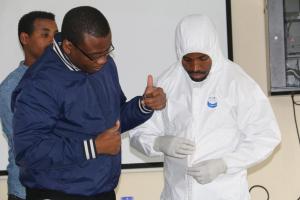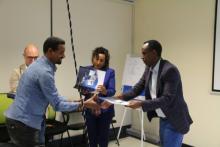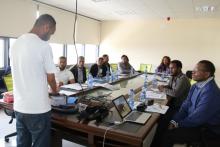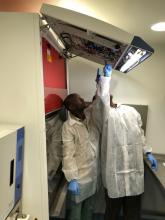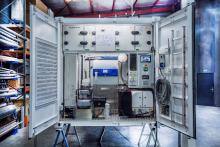WHO supports the mobile BSL-3 Lab re-qualification and training of experts
Ethiopia had secured recently the Biosafety mobile laboratory-level three (BSL-3). This laboratory is intended to manipulate highly infectious agents occurred as an outbreak while reducing the risk to laboratory workers and the environment. The Mobile -Biosafety Level -3 Lab is found in Ethiopian Public Health Institute (EPHI) compound as permanent base and it would be functional to work on any highly infectious pathogen outbreak detection. To this effect, the requalification of the laboratory to check the integrity and the training of experts on Mobile BSL-3 Lab conducted at EPHI for two consecutive weeks and various strategies were applied to provide the training. The main purpose of the training is to extend and deepen the correct use of the Mobile BSL3 laboratory.
This training was sponsored by World Health Organization (WHO) Ethiopia through UNOPS and during which, two separate and parallel courses were held for 8 maintenance technicians and 10 Laboratory researchers from 20-31 August, 2018 and 27-31 August, 2018 respectively. The training was facilitated by a team of an experienced consultancy agency (SETRA) where six facilitators with different specialization involved.
The standard modules and SOPs developed based on the WHO specification were used for the theory and practical part of this biosafety training. The training enabled the laboratory personnel to get knowledge and skill on maintenance of the equipment, safety practice and operational procedures required when handling agents from various risk groups. Prior to the training, the requalification of the laboratory to check the integrity was done by the team. The certification ceremony of the trainees was held on 31 August, 2018 at the training center (EPHI) with the presence of government officials, and representatives from WHO, UNOPS and other partners. Dr. Ebba Abate who is the Director of the Ethiopian Public Health Institute on his closing remark said that the institution has been transporting samples to other countries for some emerging highly infectious pathogens and this is a paramount achievement that would make the institution capable to handle such important public health threats.
Mr. Fransisco Ascione, the manager for SETRA company also revealed that adequate skill have been transferred for the trainee and the knowledge acquired by the trainees shall be translated into effective and continuous use. He also highlighted that it is essential to use the laboratory in a way that is familiar with procedures and maintenance to ensure the biosafety laboratory requalification is being done every year like other laboratories. Mrs. Berhane Beyene, Virology research team leader/ Head National Polio & Measles Laboratory of the Ethiopian Public Health Institute (EPHI) who coordinated the two training session on her side mentioned that this training is a key that will take forward one step to operationalize the mobile BSL-3 LAB to detect highly infectious pathogen from any outbreak in the country.
The trainees while talking during the certification ceremony also highlighted the importance of this training for themselves as well as the country. The maintenance team mentioned that they have learned to maintain the laboratory and would be able to solve any problems that might arise during their travels. Similar views were expressed by the researchers who have learned all the procedures to work in an environment of bio-safety 3. Wubayehu Kassa, one of the trainee from EPHI expressing her views about the training said that “I have learnt a lot regarding biosafety and biosecurity issues, risk assessment and management, how to work and manipulate the mobile laboratory in general, including SOP preparation and other key activities packaged in the training. Now we are capable enough to diagnoses emerging and re-emerging diseases caused because of dangerous pathogens / viruses and bacterial infection and the country will also be benefited by having sufficient trained lab personnel to handle outbreaks that may happened anywhere in the country.
Key skills were transferred to the lab researchers and maintenance personnel include introduction to Biosafety and Biosecurity, good laboratory practices, laboratory premises, safety level and agent classification, personal protective equipment, disinfection and antiseptics, laboratory cleaning and decontamination as well as technical and containment aspects of a BSL3 laboratory, emergency alarms and subsequent procedures respectively.
The laboratory is able to move around the territory and operate independently without the need for direct connection to the basic utilities (electricity and water). This allows an immediate diagnosis to be made in the field, avoiding the spread of epidemics.
For further information
Technical Contact:
Dr Bategereza Aggrey Kaijuka
WHO Ethiopia
bategerezaa [at] who.int (bategerezaa[at]who[dot]int)
Media contacts:
Selamawit Yilma
WHO Ethiopia
yilmas [at] who.int (yilmas[at]who[dot]int)



